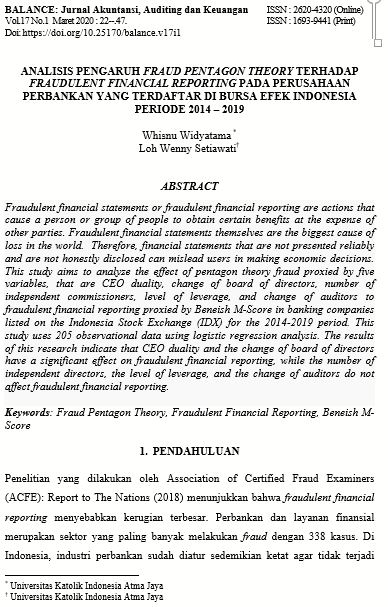ANALISIS PENGARUH FRAUD PENTAGON THEORY TERHADAP FRAUDULENT FINANCIAL REPORTING PADA PERUSAHAAN PERBANKAN YANG TERDAFTAR DI BURSA EFEK INDONESIA PERIODE 2014 – 2019
DOI:
https://doi.org/10.25170/balance.v17i1.2010Keywords:
Fraud Pentagon Theory, Fraudulent Financial Reporting, Beneish M-ScoreAbstract
Fraudulent financial statements or fraudulent financial reporting are actions that cause a person or group of people to obtain certain benefits at the expense of other parties. Fraudulent financial statements themselves are the biggest cause of loss in the world. Therefore, financial statements that are not presented reliably and are not honestly disclosed can mislead users in making economic decisions. This study aims to analyze the effect of pentagon theory fraud proxied by five variables, that are CEO duality, change of board of directors, number of independent commissioners, level of leverage, and change of auditors to fraudulent financial reporting proxied by Beneish M-Score in banking companies listed on the Indonesia Stock Exchange (IDX) for the 2014-2019 period. This study uses 205 observational data using logistic regression analysis. The results of this research indicate that CEO duality and the change of board of directors have a significant effect on fraudulent financial reporting, while the number of independent directors, the level of leverage, and the change of auditors do not affect fraudulent financial reporting.
References
Ardiyani, S., & Utaminingsih, N. S. (2015). Analisis determinan financial statement melalui pendekatan fraud triangle. Accounting Analysis Journal, 4(1), 112-125.
Association of Internal Certified Professional Accountant (AICPA). (2002). Statement on auditing standards No. 99: Consideration of fraud in a financial statement audit. New York: American Institute of Certified Public Accountant.
Beneish, M.D. (1999). The detection of earnings manipulation. Financial Analyst Journal, 55(5), 24-36
Beneish, M. D., Lee, C, M., & Nicholas, D. C. (2012). Fraud detection and expected returns. Retrieved from https://papers.ssrn.com/sol3/papers.cfm?abstract_id=1998387. Diakses pada 20 April 2020
Cressey, D. R. (1953). Other people’s money: A study of the social psychology of embezzlement. New York: Free Press.
Dumaria & Majidah. (2019). Pengaruh fraud pentagon terhadap deteksi fraudulent financial reporting dengan menggunakan metode Beneish M-Score Model (Studi empiris pada perusahaan sektor pertambangan yang terdaftar di Bursa Efek Indonesia pada tahun 2014–2017). e-Proceeding of Management, 6(2), 3148 -3156.
Horwarth, C. (2011). Why the fraud triangle is no longer enough. Retrieved from https://www.crowe.com/-/media/Crowe/LLP/folio-pdf/RISK12400H-Fraud-Webinar.ashx?la=enUS&hash=7E8BED054 C3845A48A258B4B8A896F509D17E25D. Diakses pada tanggal 17 Februari 2020.
Ikatan Akuntan Indonesia (2019). Pernyataan standar akuntansi keuangan No.1: Penyajian laporan keuangan. Jakarta: Salemba Empat
Institut Akuntan Publik Indonesia. (2019). Standar profesional akuntan publik (SPAP). Jakarta: Salemba Empat.
Kurnia, A. A., & Anis, I. (2017). Analisis Fraud Pentagon dalam mendeteksi kecurangan laporan keuangan dengan menggunakan Fraud Score Model. Journal of Simposium Nasional Akuntansi XX, 1-30.
Mardianto & Tiono, C. (2019). Analisis pengaruh fraud triangle dalam mendeteksi kecurangan laporan keuangan. Jurnal Benefita. 4(1), 87-103.
Nurbaiti, A & Suatkab, N. (2019). Analisis fraud diamond dalam mendeteksi fraudulent financial statement. Jurnal Manajemen Indonesia, 19(2). 188-197.
Phandeirot, Meliana. (2017). Pengaruh CEO duality, earning management dan corporate reputation terhadap financial performance pada perusahaan yang terdaftar di Bursa Efek Indonesia. Petra Business & Management Review, 3(1), 117-134.
PP Nomor 20 Tahun 2015 (2015). Peraturan Pemerintah Republik Indonesia Nomor 20 Tahun 2015 tentang Praktik Akuntan Publik. Jakarta: Kementerian Hukum dan Hak Asasi Manusia
Ratnasari, E. & Solikhah, B. (2019). Analysis of fraudulent financialstatement: The fraud pentagon theory approach. Gorontalo Accounting Journal (GAJ), 2(2), 98-112.
Septriani, Y., & Handayani, D. (2018). Mendeteksi kecurangan laporan keuangan dengan analisis Fraud Pentagon. Jurnal Akuntansi, Keuangan dan Bisnis, 11(1), 11-23.
Tessa, C., & Harto, P. (2016). Fraudulent financial reporting: Pengujian teori Fraud Pentagon pada sektor keuangan dan perbankan di Indonesia. Simposium Nasional Akuntansi XIX, 1-21.
Triyanto, D. N. (2019). Fraudulence financial statement analysis using Fraud Pentagon approach. Journal of Accounting Auditing and Business, 2(2), 26-36.
Ulfah, M., Nuraina, E., & Wijaya, A. L. (2017). Pengaruh fraud pentagon dalam mendeteksi fraudulent financial reporting (Studi empiris pada perbankan di indonesia yang terdaftar di BEI pada tahun 2011--2015). Forum Ilmiah Pendidikan Akuntansi, 5(1), 399–417.
Vivianita, A & Indudewi, D. (2018). Financial statement fraud pada perusahaan pertambangan yang dipengaruhi oleh Fraud Pentagon Theory. Dinamika Sosial Budaya, 20(1) , 1-15.
Wolfe, D. T. dan Hermanson, D. R. (2004). The Fraud Diamond: Considering the four elements of fraud. The CPA Journal, 74(12), 38-42.
Yang, D., Jiao, H., & Buckland, R. (2017). The determinants of financial fraud in Chinese firms: Does corporate governance as an institutional innovation matter? Technological Forecasting and Social Change, 125, 309-320.



